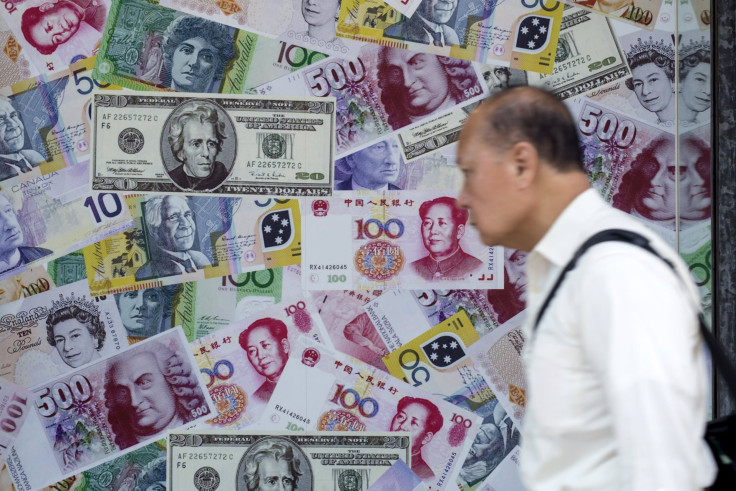Black Monday Meltdown: Here's Why Global Markets Are Panicking Over China

Think of the recent stock market volatility this way: China’s economy just jammed on the brakes — and the rest of the world didn’t have its seat belts fastened.
That about sums up the reaction in global financial markets to signs that the world’s second-largest economy is decelerating at a much faster than expected pace. The signals of deep downturn came in quick succession: First, there was China’s surprise currency devaluation two weeks ago, and then at the end of last week, data showed production in Chinese factories shrank in August at its fastest rate in more than six years.
China, which accounts for some 15 percent of global economic activity, also saw its benchmark stock index plunge more than 8 percent Monday, continuing a summerlong rout. The Chinese government’s failed attempts to prop up its stock market undermine confidence in Beijing at time when fears of a broad economic slowdown are real and growing. Market experts and economists say U.S., Asian and European stock markets haven’t finished twisting and turning as a result.
“The market is forecasting a recession,” says Adam Sarhan, founder and chief executive officer of Sarhan Capital. “The wounds from the 2008 financial crisis still haven’t been healed yet on a structural, psychological or a practical level for the global economy.”
Phil Davis, founder of PSW Investments, echoes Sarhan. “Everyone acted like the financial crisis in 2008 happened overnight, but it didn’t. It comes from ignoring all the warning signs, and China’s a big one,” says Davis.
Why China Matters In Emerging Markets
Even before the most recent developments in China, global commodity prices had been on a steady decline as China’s demand for basic materials waned. That lower demand helps explain, in part, why nearly everything from crude oil to cotton has been getting cheaper. The lower prices have big consequences for small countries that export to China.
“One of the biggest international spillover effects that we’ve seen from the slowdown in the Chinese economy is the negative effects on emerging-market economies that predominantly export commodities,” said Alessandro Theiss, economist at Oxford Economics.
China’s slowdown is especially damaging in Latin America. Chile, for example, has continued to suffer because of its dependency on copper exports. Copper has fallen 30 percent in the last year. Meanwhile, Australia is quite dependent on China's iron ore orders. Iron is down 46 percent in the same period. Asian economies, including Japan, the Philippines and Singapore will also suffer. And the U.S. dollar’s strength isn’t helping matters. Commodities are priced in dollars, so when the dollar is strong, commodity prices tend to be weak.
For those emerging markets with high levels of U.S. dollar debt or inflation problems, weaker currencies are a major threat to stability. A majority of emerging market currencies have fallen against the greenback recently, with a number, including the Malaysian ringgit, Indonesian rupiah, the Brazilian real, the Mexican peso and the South African rand, hitting multiyear lows. Experts say the main trigger for the latest declines has been the drop in commodity prices, with the currencies of the main commodity-producing countries in Latin America, along with Russia and South Africa, recording the biggest losses.
Get Ready For Deflation?
As commodity prices tumble to lows not seen since the Great Recession, Sarhan and others aren’t alone in the view that global markets are on the cusp of fearsome disorder. That is, the world could see falling prices on a wide array of goods and services, a syndrome known as deflation.
Deflation, not to be confused with disinflation, or a slowing rate of inflation, is dangerous because it reduces the supply of money and credit coursing through the economy. Commercial activity dries up as consumers and businesses put off purchases with the expectation that prices will fall even more. It can create less demand for big-ticket items from cars to washing machines. At its worst, that dwindling demand can lead to global depression.
It’s widely held that deflation contributed to the Great Depression’s massive rise of unemployment. Japan suffered from deflation during the mid-1990s, and that country still hasn’t fully recovered, despite its ongoing massive monetary stimulus programs.
Now, as China faces a slowdown, the fear is that it could have spillover effects that could lead to deflation and spread throughout the global economy. Periods of deflation typically lead to higher unemployment.
Why It Matters To The U.S.
U.S. multinationals that have direct exposure to emerging markets to fuel product growth will be affected. “It’s the Apples, but it’s also consumer staples companies, such as Colgate, Proctor & Gamble and Johnson & Johnson that have significant opportunity to grow their revenue through the emerging space,” says Tony Roth, chief investment officer at Wilmington Trust.
When those global economies suffer, it has a big impact on the ability for those multinationals to grow their market share.
Jessica Menton is a writer who covers business and the financial markets. News tips? Email me here. Follow me on Twitter @JessicaMenton.
© Copyright IBTimes 2024. All rights reserved.





















